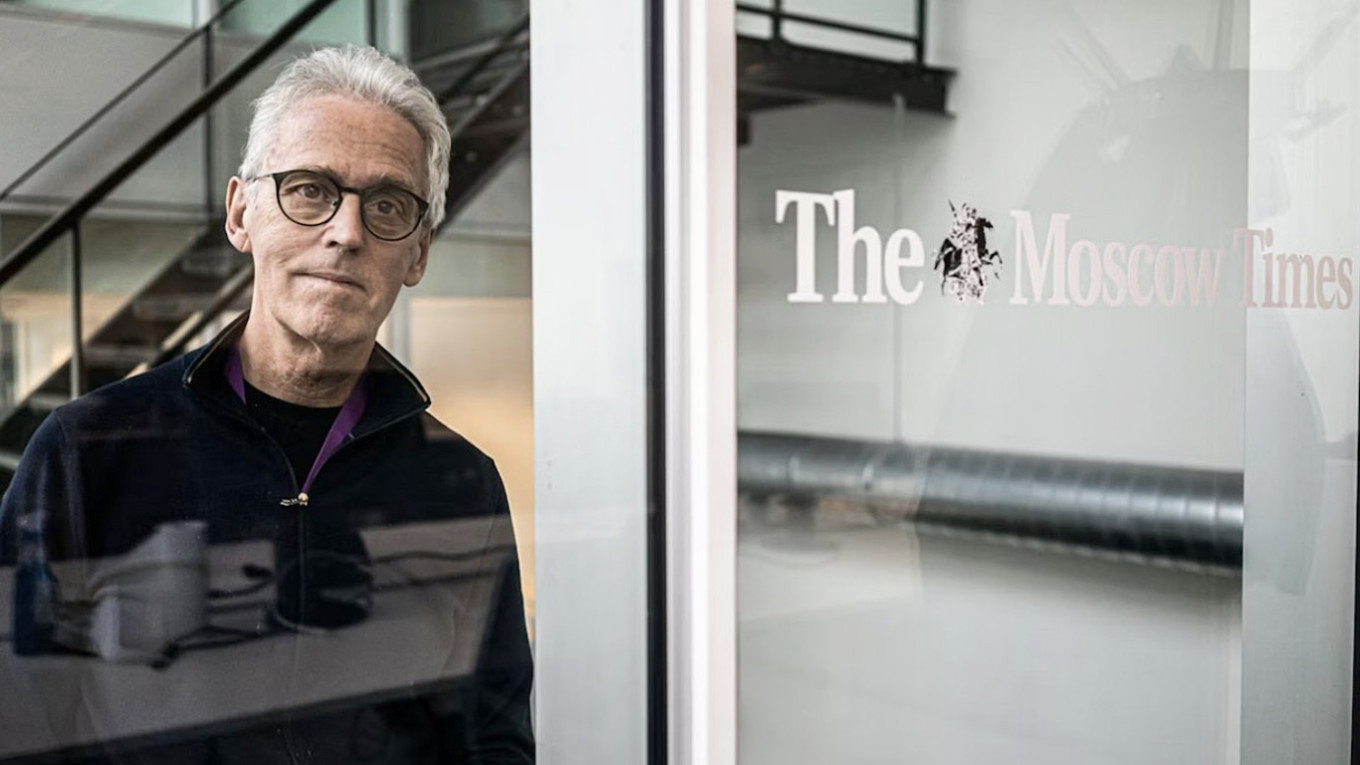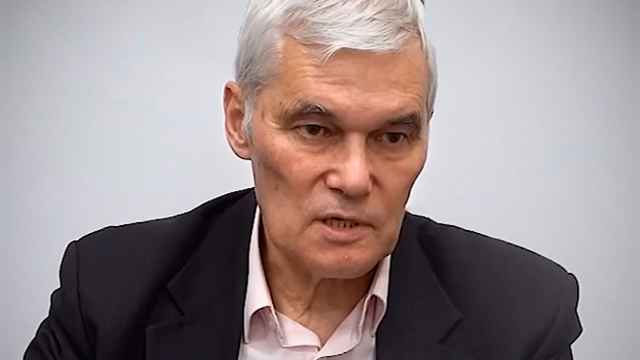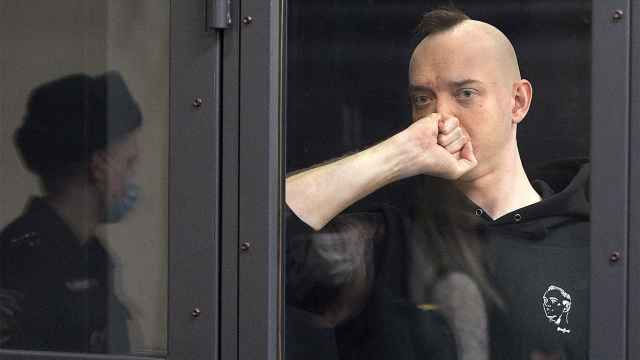Derk Sauer, Dutch media entrepreneur and founder of The Moscow Times, passed away in the Netherlands on Thursday.
Sauer, who moved to Moscow during the twilight of the Soviet Union, was responsible for founding Vedomosti, the first Western-style business daily in Russia, founding The Moscow Times and launching the Russian versions of publications like Cosmopolitan, Esquire, Harper’s Bazaar and Playboy.
After the news of his death was announced, tributes from independent Russian media and other journalists began pouring in, recounting the impact Sauer had on their careers and on Russian media as a whole.
“The success of the magazines made possible a breakthrough in quality journalism — the launch of the daily newspaper Vedomosti in September 1999. Derk assembled this venture by uniting two fierce rivals — The Wall Street Journal and Financial Times — that were unwilling to risk going it alone in a market then dominated by Kommersant, itself unable to fill more than two pages with business news,” wrote Leonid Bershidsky, Vedomosti’s first editor-in-chief, in Meduza.
“Neither Sauer nor his partners wanted Soviet journalists leading the newsroom… On the day that Derk and I flew to Zurich for Vedomosti’s first board meeting, my deputy, Alexander Gordeyev, who was also scheduled to fly with us, was arrested after a street fight. Sauer demanded that I fire Gordeyev but took no action when I refused. He gave second chances — and third chances — to everyone who didn’t sell out and worked for him as if it were their company,” Bershidsky continued.
“On the day Derk passed, Pavel Miledin, a former Vedomosti reporter, recalled how someone had carved height marks into the doorframe of our old newsroom on Vyborgskaya Street in Moscow. There was mine, and above that, a mark for the giant Sasha Gordeyev. And a meter above that, another inscription bore Derk’s name,” he wrote. “He was not a tall man, but that mark was not a form of flattery. We still had a long way to grow to reach him. We fell short. Sauer outlived the independent Russian press, which, in my admittedly biased view, he himself created. But this is not the end. Derk, thanks to you, I believe in second chances. And third ones.”
Russian journalist Xenia Lutchenko called Sauer “the man who created real Russian journalism.”
“And then, when everything he had believed in up to the last moment finally went to s***,” she wrote, “He saved dozens of journalists and very important institutions: TV Rain, The Moscow Times, and partly Meduza. These are the fates, living people; these are the projects; this is the truth about Russia, about the war, about what happened and is happening to us; this is the value of freedom of speech and the hope for revival, return, normalization.”
Yelizaveta Osetinskaya, the founder of independent business outlet The Bell who served as RBC’s editor-in-chief while Sauer was its director, wrote a lengthy tribute, calling Sauer the “godfather of the journalism and media business.”
“Derk did the most important thing: he created a system of values and relationships in which it was possible to practice honest journalism, take pride in it and earn a living at the same time. This is called a business model. In Russia, the wheels began to turn in the early 2000s, when a significant number of businesspeople believed that, as Vedomosti’s first advertisement said, ‘An oligarch can buy a newspaper. At a newsstand’,” Osetinskaya wrote on her Telegram channel.
“I ask myself: is there anyone who has done more for the development of independent media in Russia than Derk? The answer is obvious to me,” she said.
Amsterdam-based TV Rain also released a statement thanking Sauer for his help in relocating their newsroom to the Netherlands at a time when the channel’s survival seemed uncertain.
“We would hardly be on the air today if it weren't for his support,” they wrote. “He didn't have to do it, but he suddenly became a friend to dozens of TV Rain employees and their families when he helped us restart in Amsterdam and continue our work. And along with them, he became a friend to 25 million TV Rain viewers and readers around the world. For one simple reason: he believed it was important.”
“Derk, our gratitude for what you did for all of us knows no bounds. We will always remember this and always be grateful,” TV Rain’s statement read.
Even Vedomosti, the now-tightly controlled outlet he founded in 1999, paid tribute. Its editorial board called him “a man of left-wing convictions in the sense that he was generous and shared his profit with his employees.”
“Without any obligations, in the mid-2000s he gave away $2.7 million to the employees of Independent Media. ‘I,’ recalls one Vedomosti employee, ‘was able to buy my first car with that money’…"
“Derk was a unique manager, according to employees who worked with him at Vedomosti: natural and direct, very attentive to detail, always ready to listen to any issue. He personally got to know all the new employees.”
The RBC business daily, where he served as director from 2012-2015, wrote fondly of Sauer. “Sauer was a true champion of press freedom. He combined the qualities of an idealist with the insight of an independent thinker. As a columnist, Derk was a valued and experienced friend to our readers,” RBC published, quoting Dutch outlet Het Parool’s obituary.
RBC also quoted a 2014 interview Sauer gave to Afisha Daily, in which he said, “I consider myself Dutch, but my home is Russia. I like living and working here. ... Only one thing can make me leave: the inability to express myself freely and do my job as a journalist and publisher.”
In Forbes Russia, Nikolai Uskov recounted one of his encounters with Sauer:
“He and his wife Ellen always drove the kids to school on their own. One at a time. It was a sacred ritual, demonstrating family care and responsibility. But one day one of his sons said: ‘Dad, could you not take us to school anymore?! Everyone is laughing at us, saying they all have real guards, and we have some short guy with glasses.’ Derk was smiling at that moment and was absolutely satisfied with the effect he had on both me and my son's classmates. He wanted us to understand what was right and what was caused by our complexes and vices. In fact, all the media he brought to Russia was about this. I don't know about the country, but he certainly managed to change the lives and worldviews of hundreds, perhaps thousands, of his employees.”
Elsewhere on social media, people started posting their memories and tributes to Sauer.
“Derk devoted his life to building and defending independent Russian media. His legacy lives on in the countless people he inspired, and in the generations of journalists he mentored and empowered,” his son Pjotr Sauer, a journalist at The Guardian and a former Moscow Times reporter, wrote on Instagram.
Journalist Margarita Liutova wrote that she “owed her entire journalistic career,” as well as the fact that she ended up in Amsterdam, to Sauer.
BBC Russia journalist Liza Fokht called his death “an absolutely irreplaceable loss,” noting that “ a huge number of my colleagues who are engaged in free journalism are his legacy.”
Independent journalist Farida Rustamova wrote that he did “an unbelievable amount for Russian journalism, so much so that it’s even difficult to judge.”
Film critic Roman Volobuev wrote on X that, “No one fought as fiercely and relentlessly for the lost cause of Russia’s free press as Derk Sauer.”
A Message from The Moscow Times:
Dear readers,
We are facing unprecedented challenges. Russia's Prosecutor General's Office has designated The Moscow Times as an "undesirable" organization, criminalizing our work and putting our staff at risk of prosecution. This follows our earlier unjust labeling as a "foreign agent."
These actions are direct attempts to silence independent journalism in Russia. The authorities claim our work "discredits the decisions of the Russian leadership." We see things differently: we strive to provide accurate, unbiased reporting on Russia.
We, the journalists of The Moscow Times, refuse to be silenced. But to continue our work, we need your help.
Your support, no matter how small, makes a world of difference. If you can, please support us monthly starting from just $2. It's quick to set up, and every contribution makes a significant impact.
By supporting The Moscow Times, you're defending open, independent journalism in the face of repression. Thank you for standing with us.
Remind me later.






